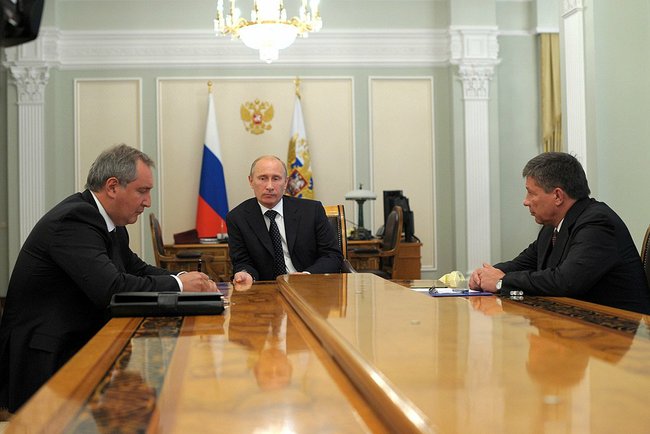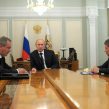
Putin Plans to Rearm Russia Against the West with Western Help
Publication: Eurasia Daily Monitor Volume: 9 Issue: 161
By:

During the mass public protest demonstrations in Moscow that began last December, one of the most popular public slogans has been “Putin—vor [thief]!” This catchphrase unites opposition forces that in most cases have little else in common: pro-Western liberals, Marxist leftists and pro-Nazi nationalists—the three main “columns” of the anti-Putin movement. Massive bribery, budget misappropriation and nepotism have corrupted the Russian state from top to bottom under Vladimir Putin’s watch, according to a recent report by human rights advocate organization “Clear Hands.” In 2008, newly appointed President Dmitry Medvedev announced an anticorruption campaign. But after four years, the overall result has been negative with corruption steadily multiplying. According to “Clear Hands’” research, some 52.6 percent of Russia’s GDP is redistributed through “shady corrupt schemes” (Kommersant, August 23).
The scourge of corruption is recognized by all, including Russia’s corrupt rulers themselves. But Leonid Bershidsky—a well-known Russian newspaper editor, novelist and banker—argues in a recent opinion piece in the Vedomosti daily that Putin’s anti-Western ideology is more dangerous than his corruption. According to Bershidsky, Putin believes Russia is surrounded by foreign (US-led) enemies that have managed to build a strong “fifth column” of foreign agents within the country—the anti-Putin protest movement. In this siege situation, Putin is disproportionately boosting budget spending on defense, police and security services, inflicting more damage to the well-being of the nation than corruption per se (Vedomosti, August 23).
Last week, in a move that seems to confirm Bershidsky’s assertions, Putin reminded, while chairing a meeting of the National Security Council on the rearmament of the military and the modernization of the defense industry, that “a staggering” 23 trillion rubles ($718 billion) will be spent until 2020 to produce new armaments and “these funds must not be squandered, but new items ought to be procured.” Putin acknowledged that the Russian defense industry stagnated over “the last 30 years,” and an aggressive modernization effort is needed, “comparable to the industrial modernization breakthrough in the 1930s” to “obtain critical technologies to mass produce modern high quality weapons” (www.kremlin.ru, August 31). In the 1930s, under Soviet dictator Josef Stalin, an extensive defense industry base was built that helped transform Russia into a world nuclear military superpower after World War II. Millions of Russians were executed during this “industrialization” or perished in the gulag, building new defense industry factories, mines, railroads or steel mills, which enabled Russia to successfully challenge the United States during the decades of proxy wars and the arms race of the Cold War period.
According to Putin, the Russian military industrial complex will take the lead and help modernize the entire economy, pulling Russia forward as a “locomotive.” Private and government-owned companies must cooperate in the Russian rearmament and defense industry modernization. Western know-how and technologies may be acquired from foreign “partners.” But Putin opposes a licensed assembly of “Western-type weapons in Russia using foreign components and parts.” Putin insists: “This is a dead end, only mass production of Russian-designed weapons using Russian-made components will guarantee national, technological and defense security” (kremlin.ru, August 31). Apparently this implies that Russia’s planned rearmament is aimed to confront the West and the US in particular, seen as the main potential enemy of Putin’s regime, capable of exerting pressure to contain the Kremlin’s attempts to dominate neighboring nations like Ukraine or Georgia and be at the same time an inspiration to Russian pro-democracy activists.
Only Putin’s opening remarks at the Security Council meeting were published, while the keynote speech by Deputy Prime Minister Dmitry Rogozin (in charge of the defense industry) and all the rest of the proceedings were kept secret. However, earlier last week, Rogozin told journalists: “Because of the present world economic crisis and cuts in defense spending, Westerners are ready to sell Russia virtually any weapons or sensitive technologies.” According to Rogozin, “We must use this new ‘openness’ to localize on Russian territory modern Western technologies” (RIA Novosti, August 27). Stalin’s “industrialization” was also based on buying Western (primarily American) military and double-use technologies and know-how, as well as enlisting the help of foreign scientists and engineers. In a particularly cynical example of the successful exploitation of Western greed and foolhardiness, Moscow, not having at the time its own fighter jet engines, purchased some from Britain after World War II and mass-produced MIG jet fighters, armed with copycat engines that badly harassed the US air force during the Korean War in 1950–1953. Apparently, today Putin and Rogozin are hoping to pull off something similar.
As a former KGB spy recruiter, Putin was trained to find Westerners eligible to be turned into “friends.” In an interview this week with the Kremlin-financed television channel Russia Today, Putin de facto endorsed Barack Obama, “who together with Medvedev did a lot in the last four years to improve US-Russian relations.” Putin said he had probed Obama during a meeting last June in Los Cabos, Mexico, during a G20 summit and “he appears to be a sincere person who wants to change things for the better.” But, fretted Putin, will the Washington establishment allow Obama to become a friend? The Russian President spelled out what the US must do: join the Russian position on Syria, supporting a “negotiated solution” that will keep the regime in Damascus in power, and become Moscow’s “trusted ally and partner” by financing a joint BMD system with a joint command structure that will give Putin the option to switch it off anytime. In the same interview, Putin insisted he is doing the right thing suppressing the protest movement in Russia and jailing opponents. Putin said he will “work” with Obama’s Republican rival Mitt Romney, if he is elected, but called his criticism of Russia “mistaken campaign rhetoric,” accusing Romney “of using in international affairs the equivalent of the instruments of nationalism and segregation” (kremlin.ru, September 6). It seems Putin has cast an early vote in the US elections, openly choosing the candidate that he believes will serve his interests best.




